pharmaphorum Podcast
pharmaphorum is one of the leading global channels for insight into the pharma and healthcare industry – and is essentially a group of passionate people who like asking excellent questions. Our podcasts offer a chance to pose some of these questions to the keenest minds in our industry to look at the big issues and opportunities facing pharma, biotech and healthcare today. With interviews and contributions from a host of industry experts and insiders, the pharmaphorum podcast is a must-listen for those who want insight into the future of health and medicine.
Episodes
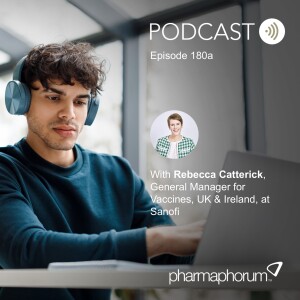
Friday May 23, 2025
Friday May 23, 2025
As has been widely reported on, immunisation rates, including for flu and RSV, have been falling – at a troubling rate – and diseases like whooping cough and measles have seen a worrying resurgence due to anti-vaxxers. And not just in the US.
In a new pharmaphorum podcast, Rebecca Catterick, General Manager for Vaccines, UK & Ireland, at Sanofi, discusses this decline in vaccination rates, as well as what can be done to turn the situation around.
Catterick explores the role of the UK Labour Government’s Child Health Action Plan, aligning as it does with NHS vaccination strategy priorities, and also the criticality of preventative measures, including primary and secondary prevention and its role in the 10-year health plan.
You can listen to episode 180a of the pharmaphorum podcast in the player below, download the episode to your computer, or find it - and subscribe to the rest of the series - in iTunes, Spotify, Amazon Music, Podbean, and pretty much wherever you get your other podcasts!
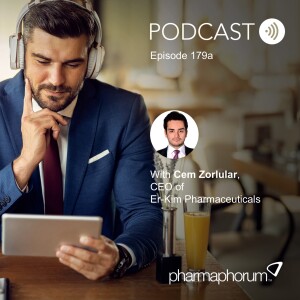
Monday May 19, 2025
Monday May 19, 2025
Early access programmes (EAPs) for novel medicines are an often-misunderstood strategy outside of western markets.
In a new pharmaphorum podcast, web editor Nicole Raleigh speaks with Cem Zorlular, CEO of Er-Kim Pharmaceuticals, a company that has been serving as a regional affiliate for pharma and biotech since 1981 in the CEE and Mediterranean.
Market access strategies in many international markets do not function the same way as they do in the US or Western Europe and require a different approach. Zorlular explains how EAPs can drive revenue for pharmaceutical companies from international unlicensed markets, but that most importantly EAPs allow patients access to life-altering novel medicines.
What’s more, he says, EAPs can also help shape the biotech space by supporting the opportunity for RWD collection outside of the clinical trial setting and build momentum with local payers, regulators, and the medical community.
You can listen to episode 179a of the pharmaphorum podcast in the player below, download the episode to your computer, or find it - and subscribe to the rest of the series - in iTunes, Spotify, Amazon Music, Podbean, and pretty much wherever you get your other podcasts!
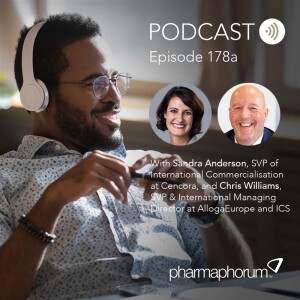
Friday May 09, 2025
Friday May 09, 2025
With the FDA and EMA releasing their annual reports detailing novel drug approvals in 2024, a new pharmaphorum podcast looks at recent trends related to drug approvals, as well as challenges and opportunities both small and large pharma companies face in the year ahead.
Host Nicole Raleigh is joined by Cencora’s Sandra Anderson, SVP of International Commercialisation, and Chris Williams, SVP & International Managing Director at Alloga Europe and ICS, which are part of Cencora – and the conversation dives into takeaways such as the increase in smaller biotech companies taking their product to market on their own, what is needed to ensure a successful go-to-market strategy, the unique logistics and supply chain considerations specialty pharmaceutical products introduce, and also geographical considerations, with 34 of the 50 novel drugs approved in 2024 being in the US before any other country.
You can listen to episode 178a of the pharmaphorum podcast in the player below, download the episode to your computer, or find it - and subscribe to the rest of the series - in iTunes, Spotify, Amazon Music, Podbean, and pretty much wherever you get your other podcasts!
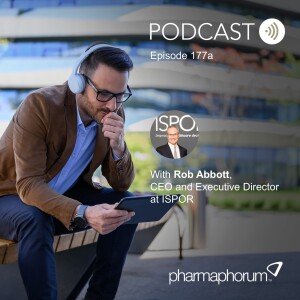
Tuesday May 06, 2025
Tuesday May 06, 2025
ISPOR 2025, the leading global conference for Health Economics and Outcomes Research (HEOR), takes place 13th-16th May and marks the 30th anniversary of the organisation.
Ahead of the event, web editor Nicole Raleigh spoke with Rob Abbott, CEO and executive director of ISPOR – the leading professional society for HEOR globally – about the ins and outs and trends of HEOR.
ISPOR’s mission is to advance HEOR excellence to improve decision making for health globally, and Abbott explains its focus on the value of particular healthcare interventions, the impact on the quality of life of patients, and how his work is centred around positioning HEOR as a key lever for decision makers and shapers globally to create a world in which healthcare is accessible, effective, efficient, and affordable for everyone.
You can listen to episode 177a of the pharmaphorum podcast in the player below, download the episode to your computer, or find it - and subscribe to the rest of the series - in iTunes, Spotify, Amazon Music, Podbean, and pretty much wherever you get your other podcasts!

Friday May 02, 2025
Friday May 02, 2025
President Donald Trump’s April 15th executive order, “Lowering Drug Prices by Once Again Putting Americans First”, contained a smorgasbord of policy proposals targeting a variety of industry stakeholders.
But how much legal force do these different elements have, and what are the concrete takeaways for pharma? To answer these questions and more, host Jonah Comstock once again welcomes Hogan Lovells attorney Alice Valder Curran to the podcast to pick apart the order piece by piece.
They discuss the headline – Trump’s intention to eliminate the Inflation Reduction Act’s “pill penalty”, and talk about why the language is more ambiguous than it appears and could be good or bad news for pharma.
They also talk about PBM reform, closing 340B loopholes, and how much the Federal government can really do to promote drug importation from Canada at the state level.
Check out the podcast to learn everything you wanted to know about Trump’s Executive Order.
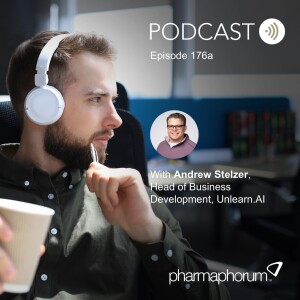
Thursday May 01, 2025
Thursday May 01, 2025
It can take up to 15 years for a new drug to reach the market, and with only 20% of pharmaceutical professionals adopting AI, one thing is clear: innovation in drug development is lagging behind.
In a new pharmaphorum podcast, web editor Nicole Raleigh speaks with Andrew Stelzer, head of business development at Unlearn.AI, about how the real hurdle in clinical research lies in effectively integrating AI.
Stelzer discusses the need for greater coordination within the pharmaceutical industry, particularly between life sciences and software engineering and explains how bridging the cultural divide can significantly enhance the adoption of emerging technologies like AI.
Of course, the conversation also touches upon the importance of collaboration, which can positively empower pharmaceutical companies to overcome existing challenges and drive significant advancements in drug development.
You can listen to episode 176a of the pharmaphorum podcast in the player below, download the episode to your computer, or find it - and subscribe to the rest of the series - in iTunes, Spotify, Amazon Music, Podbean, and pretty much wherever you get your other podcasts!
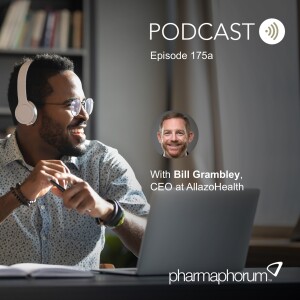
Tuesday Apr 29, 2025
Tuesday Apr 29, 2025
Therapy initiation, adherence, and health outcomes are being driven by artificial intelligence (AI)-powered personalisation. Today’s consumers are more active participants in their healthcare. Marketing in the era of consumer-driven healthcare requires new strategies to reach patients with the information they require, and how and when they need it.
In a new pharmaphorum podcast, web editor Nicole Raleigh speaks with Bill Grambley, CEO of AllazoHealth, for a conversation on leveraging AI for marketing, as well as medication initiation and adherence.
Grambley discusses how AI can be leveraged to create highly personalised patient engagement strategies, tailored to individual needs and preferences, as well as the technology can be used to identify patients at risk of medication non-adherence and intervene early to prevent negative outcomes.
The conversation touches upon the ethical implications of using AI to collect and analyse patient data, and how pharmaceutical companies are ensuring patient data privacy and security while leveraging AI to improve outcomes, in addition to the regulatory landscape and the future horizon.
You can listen to episode 175a of the pharmaphorum podcast in the player below, download the episode to your computer, or find it - and subscribe to the rest of the series - in iTunes, Spotify, Amazon Music, Podbean, and pretty much wherever you get your other podcasts!
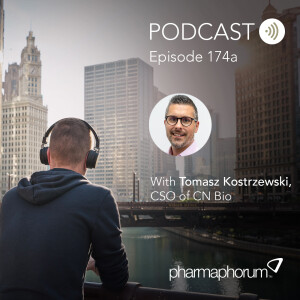
Tuesday Apr 22, 2025
Tuesday Apr 22, 2025
In a new pharmaphorum podcast, web editor Nicole Raleigh speaks with Tomasz Kostriezewski, CSO at CN Bio, about single organ-on-a-chip technology and multi-organ microphysiological systems (MPS), as well as accelerating drug discovery pipelines with these new alternative methodologies (NAMs).
Clinical trial success rates are very low, with up to 95% not succeeding, and a wide range of disease states remains untreated. What NAMs permit is a screening of new drugs, of whatever entity – chemical or biological – to better predict how they will behave when put into a patient, says Kostriezewski.
From metabolic to neurological diseases, as well as oncological – the applicability of organ-on-a-chip technologies is wide ranging, and regulators have been taking a more active role in trying to understand their role and value, and thereby validate their contextual usage at a future point. Nonetheless, already data is accepted today using this new approach, explains Kostriezewski, providing further insights on the landscape as market adoption continues to grow globally.
You can listen to episode 174a of the pharmaphorum podcast in the player below, download the episode to your computer, or find it - and subscribe to the rest of the series - in iTunes, Spotify, Amazon Music, Podbean, and pretty much wherever you get your other podcasts!

Wednesday Apr 16, 2025
Wednesday Apr 16, 2025
Across the life sciences, Regulatory Affairs (RA) teams and their colleagues in Quality and Safety are stretched beyond their limits as already impossible demands on their time are compounded by rising health authority expectations.
In a new pharmaphorum podcast, web editor Nicole Raleigh speaks with Sonia A. Veluchamy, CEO and co-founder of Celegence, a company dedicated to improving patient outcomes through intelligent regulatory compliance.
For both pharma and medical device companies, time and bandwidth are the number one challenge RA professionals face, closely followed by costs and budgetary pressures (the latter being a more pronounced concern for medical device companies). And, as the medical device sector responds to rising demands internationally around device identification, traceability, safety, and surveillance – designed to reinforce product quality and safety – companies have a chance to expedite their preparations, by looking to the adjacent pharma industry for lessons still being learned.
Veluchamy dives into the details and explains what all these endeavours ultimately mean for patients.
You can listen to episode 173a of the pharmaphorum podcast in the player below, download the episode to your computer, or find it - and subscribe to the rest of the series - in iTunes, Spotify, Amazon Music, Podbean, and pretty much wherever you get your other podcasts!
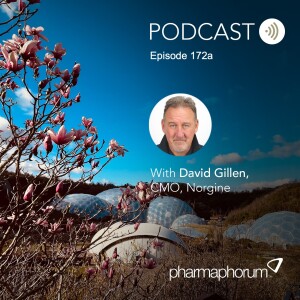
Tuesday Apr 15, 2025
Tuesday Apr 15, 2025
In a new pharmaphorum podcast, recorded during Anthropy 2025: Rebooting Britain, web editor Nicole Raleigh spoke with David Gillen, chief medical officer at Norgine, about the role of prevention in the future of healthcare.
Recorded onsite at The Eden Project in Cornwall, the conversation centred around the Adelphi Group-sponsored panel, ‘The Prevention Revolution in Your Healthcare’, exploring the key takeaways and exciting possibilities from the panel discussion.
Prevention is increasingly seen as contributing to a healthier and more productive society. But, as healthcare resources are stretched and medical science is accelerating, the question remains: how do we make prevention a reality? Encouragingly, healthcare systems are increasingly seeing the health, social, and economic benefits of prevention when it is delivered in an evidence-based way.
You can listen to episode 172a of the pharmaphorum podcast in the player below, download the episode to your computer, or find it - and subscribe to the rest of the series - in iTunes, Spotify, Amazon Music, Podbean, and pretty much wherever you get your other podcasts!







